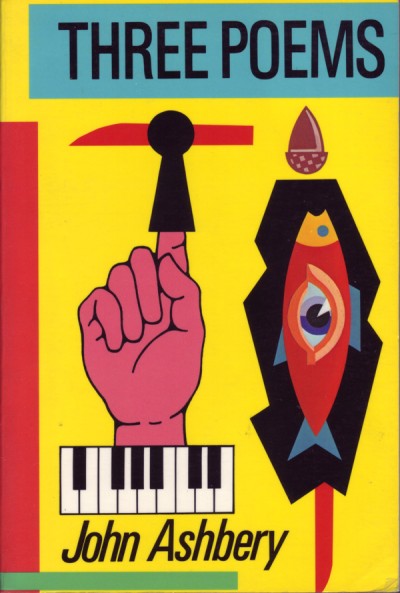 John Ashbery, My Guide
John Ashbery, My Guide
The past three decades have been an exciting time for poets from formerly Soviet nations. Many contemporary poets from this region came of age (and established their voices) while poetry was inextricably linked to rebellion against communist regimes. You were a protest poet—or you weren’t a poet. But after the dissolution of many corrupt governments in the 1980s, poets were able to inhabit or create different identities—even apolitical ones.
I find myself hungry for these voices, and want to hear their stories. I’ll be the first to admit I often lack the context for the works—and I’m reading English translations to boot. As an American reader, I lean on more familiar poets to be my guides. Slovenian poet Tomaž Šalamun has often cited his affinity for (and influence by) American poet John Ashbery. And so, Ashbery has been my escort through Šalamun and other poets from this region.
When considering the realities of life for a poet under Soviet dominance and its aftermath, it’s no surprise that Ashbery’s work took root there. Metaphors of a military control over personal life, guilt or shame in the family/private sphere, and the limits of religion in giving comfort appear often in Ashbery’s poetry.
Ashbery strikes perhaps his most powerful notes when he explores the impossibility of capturing events in a narrative. He finds the notion of recorded history unreliable, if not impossible. This set up the creation of his own abstract work, and paved the way for future abstract poets to be accepted by the American reading public.
Ashbery Deconstructs
A modernist take on history is consummately deconstructed in Ashbery’s work. This view is explored in poems such as “Lacrimae Return”:
All our resources are being trained
in this critical juncture in our fate’s history.
It’s no longer a novel or a nursery rhyme,
A catch or a glee, but a sermon grinding on continuously.
What if concepts like Fate, Time or History are nothing but “a sermon grinding on continuously”? If they go on and on, but signify nothing? What can we believe in? According to Ashbery, not much.
The poem “Image Problem” questions how humans decide what is real or imagined.
The solution may therefore be
to narrow the zone of reaction to a pinprick
and ignore what went on before
even when we called it life,
knowing we could never count on it for comfort
or even a reference, the idea being to cut one’s losses
on the brink of winning.
When we abandon analysis of the past, we’re left with few paths. Futurism invites us to forget, and celebrate only what’s on the horizon: transition, change, innovation and speed. Surrealism lets the unconscious mind take over—dreams and images, no matter how impossible, are brought to life in visual art or writing. Ashbery’s choice was Absurdism, which holds that human certainty is impossible, and all attempts to impose order on the universe are futile. Life offers no comfort; neither does it provide a reliable way to derive meaning from events. His advice is to hold on to nothing, and abandon any effort to make sense of things. The truly absurd act would to believe that in life we are moving toward a winning. Instead, this poem beseeches the reader, cut your losses and walk away.
But why Ashbery’s brand of abstract poetry, and why Eastern Europe? To start with: its subversive nature.
The Abstract as Subversive
Šalamun played the role of political poet in his youth—albeit unwillingly. In a wonderful conversation with fellow Slovenian poet Charles Simic, Šalamun recounted why he was briefly imprisoned:
…In ’64. There was a very important cultural literary magazine called Perspektive in Ljubljana, which was battling with the official communist line… When they came to the border of being abolished, I was named editor in chief because they wanted to save the journal by putting an innocent young man in the position. And then I published a poem, which I thought was a kind poem, nothing special, but the government ideologues thought the poem itself and the gesture of me being put in charge as editor in chief was so transgressive that I found myself in jail.
Abstract poetry can be transgressive, in its very nature, by embracing the absurd and confounding all authority figures.
But because the system was very sophisticated then, when I came out of jail people from the Secret Service—the Udba—said, ‘Oh, you lost your steam, you don’t write any protest poems anymore.’ My second book, still published by myself, was about butterflies, about nothing. It was more subversive than if I would write protest poems, since the government needed to show its pluralism and democracy. One has to be very precise not to be corrupt or used.
Any yet, there is so much more to the work of Šalamun than abstraction for its own sake, or for subversive reasons. Šalamun brings readers strange moments of beauty that linger long after a reading is done. One of my favorite Šalamun poems, “The Dead,” includes these lines:
Maybe they’re not so talentless
and crackle underwater like shells
and stones, such that every thousand years
of crackling harvests us
a tiny white stone.
Time repeats and human beings are re-harvested, just as the word “crackling” repeats in the poem. Time is clearly not linear—but we’re never quite sure how it works.
 Laura Eppinger graduated from Marquette University with a degree in Journalism. Her laptop screen got cracked during a year in Cape Town, South Africa, but it never stopped her from writing. Her publications list lives here.
Laura Eppinger graduated from Marquette University with a degree in Journalism. Her laptop screen got cracked during a year in Cape Town, South Africa, but it never stopped her from writing. Her publications list lives here.


0 comments on “John Ashbery and the Eastern Bloc: The Absurd is Our Guide”